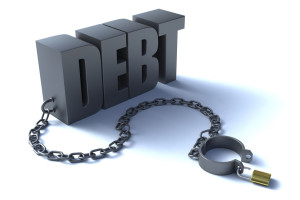
With the start of a new year, getting out of debt has recently become a major goal for some Americans. With the average American household having nearly $130,000 in debt, it’s no wonder that many people are ready to take the steps needed to reduce and ultimately conquer large amounts of debt.
However, getting out of debt is just the first step. In order to gain financial freedom and peace regarding your finances, you must also master the task of staying out of debt. Below we have listed several tips to help you do just that.
1. Write down a plan that includes goals. What are your financial goals? Do you plan to retire in the next 5-10 years? Do you need money to send your children or grandchildren off to college? Are you eager to pay your mortgage off within the next few years? Write down your goals along with a plan to help you accomplish each of them. For example, if one of your goals is to pay off your home in 5 years, figure out how many additional payments you’ll need to make, as well as how to come up with the money to make those additional payments.
2. Establish a budget & stick to it. Establishing a budget is probably the most important step in getting out, and staying out, of debt. Write down your sources of income, your monthly bills, and your monthly expenses. Make sure that every dollar you earn is accounted for within your budget. Assigning all of your income to a bill, expense, or savings account will help you to ditch reckless spending habits and ensure that you don’t misuse your money.
3. Start paying down your debts. One would think that the best way to pay down debt fast is to start with the debts that have the highest interest rate. On the surface, this seems to make a lot of sense; however, Dave Ramsey’s Snowball Method has been known to be quite effective in eliminating debt and it is based on the idea of paying down the smallest debts first while making your way up to bigger debts. The idea is that if you start with smaller debts you can pay them off faster and once you begin to see the results of paying down smaller debts, you’ll be encouraged by your progress and be even more prompted to tackle the bigger debts.
4. Learn to say “no”. Okay, so you’ve established a budget for yourself and have learned to stick to it, but what about when your brother asks you to borrow some money, or your kid requests an expensive birthday gift? Learning to say “no” to others is part of ensuring that you stay out of debt. If you can’t afford to lend money or buy expensive gifts then don’t stretch yourself and risk getting back into debt.
5. Establish an emergency fund. After you’ve paid down a good portion of your debts, saving money is the next step to ensure that you don’t get back into debt. An emergency fund is an account that you save money in in case of emergencies. This way, when an emergency comes up such as your car breaking down or your furnace going out, you can pull out money from your emergency fund as opposed to using your credit card or having to take out a personal loan. To build up your emergency fund, try depositing a certain amount of each check into that account– for example, $75 per pay check. Assuming you get paid twice a month, this will amount to $150 a month and $1,800 a year.
Needless to say increasing your income is also a great way to help you get out and stay out of debt. You can do this by getting a second job, picking up a hobby that produces revenue, or selling assets that you no longer want or need. However the most important thing to keep in mind is that managing your money correctly can help you stay out of debt and have money for the things you need.

